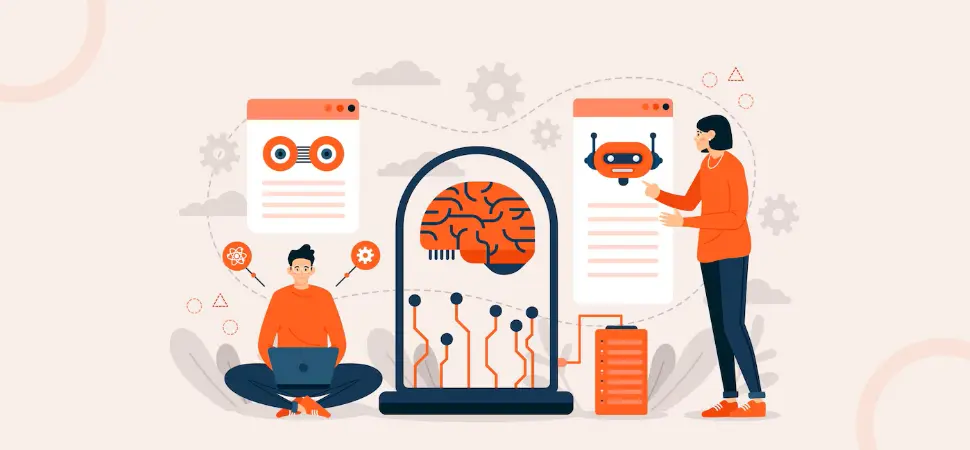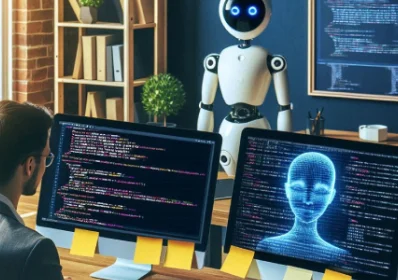The Evolution of Generative AI Models: A Complete Guide

Artificial Intelligence has made monumental strides in recent years, particularly in generative models. These models, capable of creating new data samples similar to those they were trained on, have revolutionized various fields including art, music, text generation, and more. In this comprehensive guide, we will delve into the evolution, workings, applications, benefits, challenges, and examples of generative AI models.
Overview of Generative AI Models

Generative AI models are a subset of AI that aims to generate new data samples that resemble the input data. Unlike discriminative models, which classify input data into predefined categories, generative models create new data instances from scratch. These models have gained immense popularity due to their ability to create realistic and novel outputs across different domains.
Types of Generative AI Models
Several types of generative AI models exist, with some of the most notable being:
Variational Autoencoders (VAEs):
These models learn a low-dimensional representation of input data and generate new samples by sampling from this learned distribution.
Generative Adversarial Networks (GANs):
GANs consist of two neural networks, a generator and a discriminator, which compete against each other to produce increasingly realistic samples.
Autoregressive Models:
These models generate data sequentially, with each step conditioned on previous steps. Examples include PixelCNN and WaveNet.
Flow-based Models:
Flow-based models directly model the data distribution and can generate samples by transforming noise distributions into data samples.
How Do Generative AI Models Work?
Generative AI models leverage complex mathematical frameworks and algorithms to learn patterns and relationships within the input data. These models are trained on large datasets and learn to generate new samples by sampling from the learned data distribution.
How Are Generative AI Models Trained?
Training generative AI models involves feeding them with large amounts of data and optimizing their parameters to minimize the difference between the generated samples and the real data. This process often requires significant computational resources and can take a long time, depending on the complexity of the model and the size of the dataset.
What Can Generative AI Models Do?
Generative AI models have a wide range of applications across various domains, including:
Image Generation: Creating realistic images from scratch, altering image styles, and generating high-resolution images.
Text Generation: Generating coherent and contextually relevant text, including stories, poems, and articles.
Music Generation: Composing new music pieces in various genres and styles.
Data Augmentation: Generating synthetic data to augment existing datasets for training machine learning models.
Anomaly Detection: Identifying anomalies or outliers in data distributions.
Also Read: How Is Artificial Intelligence Transforming The Business World
What are the Benefits of Generative AI Models?

Generative AI models offer several benefits, including:
Creativity
AI models are at the forefront of pushing the boundaries of human creativity. These models possess the remarkable ability to generate novel and imaginative outputs that challenge conventional notions of what is possible. Whether it's generating lifelike images, composing original music, or crafting compelling narratives, generative AI continually surprises and inspires with its creative prowess. By leveraging vast amounts of data and sophisticated algorithms, generative AI can emulate artistic styles, blend disparate concepts, and even invent entirely new forms of expression.This capacity for creativity not only enriches artistic endeavors but also has practical applications across industries.
For instance, in product design, generative AI can generate innovative prototypes and concepts, accelerating the development cycle and fostering innovation. In marketing and advertising, generative AI can create engaging content that captures the imagination of audiences, driving brand awareness and engagement. Overall, the creative potential of generative AI knows no bounds, offering endless possibilities for exploration, experimentation, and expression.They enable automation of creative tasks, saving time and resources for businesses and individuals.
Data Augmentation
Generative models can generate synthetic data samples that are similar to real data instances, thereby increasing the diversity and quantity of training data. This is particularly useful in scenarios where collecting large amounts of labeled data is costly, time-consuming, or impractical. By augmenting the dataset, generative models help improve the generalization ability of machine learning models, leading to better performance on unseen data.
Automation
Generative AI models have revolutionized automation by extending its reach beyond routine tasks of creativity. Traditionally, automation has been associated with streamlining repetitive processes, reducing errors, and increasing efficiency. However, with the advent of generative AI, automation now encompasses creative tasks that were previously exclusive to human ingenuity.
These models can analyze vast amounts of data, learn underlying patterns, and autonomously generate new content across various domains, including art, design, music, and literature. By automating creative tasks, generative AI not only saves time and resources for businesses and individuals but also opens up new possibilities for innovation and exploration. Moreover, by freeing up human creativity from mundane tasks, generative AI empowers individuals to focus on higher-level decision-making, problem-solving, and strategic endeavours, leading to greater productivity and fulfillment.
Personalization
Generative models can generate personalized content or recommendations based on user preferences and historical data. In recommender systems, generative models enable the creation of personalized product recommendations, content suggestions, and advertisements. By tailoring content to individual users, generative models enhance user engagement, satisfaction, and retention.
What are the Challenges of Generative AI Models?

Despite their numerous benefits, generative AI models also face several challenges, such as:
Training Complexity
Generative models demand substantial computational resources and expertise due to their intricate architectures and training procedures. Achieving optimal performance often involves tuning numerous hyperparameters and conducting extensive experimentation, making the training process both resource-intensive and technically challenging.
Mode Collapse
GANs, in particular, are susceptible to mode collapse, a phenomenon where the generator produces a limited variety of outputs, failing to capture the full diversity of the underlying data distribution. This issue can hinder the model's ability to generate high-quality and diverse samples, impacting its overall effectiveness in practical applications.
Ethical Concerns
The use of generative models raises ethical concerns, especially in generating fake content such as deepfakes, which can deceive or manipulate individuals, propagate misinformation, and undermine trust in media and information sources. Addressing these ethical dilemmas requires careful consideration of the potential societal impacts and the development of responsible guidelines and regulations for the responsible use of generative technology.
Ethical Concerns
The use of generative models raises ethical concerns, especially in generating fake content such as deepfakes, which can deceive or manipulate individuals, propagate misinformation, and undermine trust in media and information sources. Addressing these ethical dilemmas requires careful consideration of the potential societal impacts and the development of responsible guidelines and regulations for the responsible use of generative technology.
Evaluation Metrics
Assessing the quality of generated samples poses a significant challenge, as traditional evaluation metrics may not adequately capture the complexity, diversity, and realism of generated data. Developing robust evaluation metrics that account for various aspects of generated content, including visual fidelity, semantic coherence, and diversity, remains an ongoing research endeavour in the field of generative modelling.
Examples of Generative AI Models
Some notable examples of generative AI models include:
DeepDream: Developed by Google, DeepDream generates dream-like images by amplifying and modifying patterns in existing images.
StyleGAN : NVIDIA's StyleGAN generates high-quality, realistic images with customizable styles and attributes.
GPT-4: OpenAI's GPT-4 is a state-of-the-art language model capable of generating coherent and contextually relevant text across various domains.
Bottom Line
Generative AI models have undergone a remarkable evolution in recent years, enabling creativity, automation, and personalization across various domains. Whether you're looking to leverage AI technology in your applications or build your own AI models, it's essential to partner with experts who understand the intricacies of generative AI. Contact Innow8 Apps to explore how generative AI can transform your business and unlock new possibilities in innovation and creativity.
FAQs
Can generative AI models be used for data privacy and security?
Yes, generative models can generate synthetic data that preserves the statistical properties of the original data while ensuring privacy by removing sensitive information. This synthetic data can be used for analysis and sharing without exposing sensitive information.
What are some emerging trends in generative AI research?
Emerging trends include the development of more efficient and stable training algorithms for generative models, research into novel architectures such as transformer-based models, and advancements in multimodal generation for synthesizing diverse types of data simultaneously.
How can generative AI models be used in healthcare?
Generative models can assist in medical imaging tasks such as denoising, super-resolution, and image synthesis. They can also generate synthetic patient data for training predictive models while preserving patient privacy.
Discover the Future of AI Generation
Recent Blogs:

Top 5 Mobile app Trends that you'll love [jan...
Mobile App Trends 2023- Here are the points from top mobile app experts about the arising tr...
Read More
A Complete Guide on Android & iOS Mobile App ...
Discover the differences between iOS & Android in mobile application development. Learn abou...
Read More
How to Create an AI Assistant for Web & Mobil...
Learn how to build AI assistants for web and mobile apps with key tools and best practices....
Read More